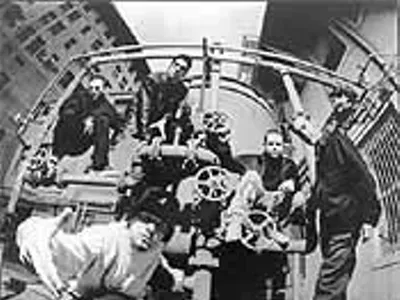
Audio By Carbonatix
[
{
"name": "GPT - Leaderboard - Inline - Content",
"component": "35519556",
"insertPoint": "5th",
"startingPoint": "3",
"requiredCountToDisplay": "3",
"maxInsertions": 100,
"adList": [
{
"adPreset": "LeaderboardInline"
}
]
}
]
It always begins in that glorious ‘mistake,’ the crazy unexpected note kicking out sideways to let us loose again no matter what you call it. It reappears periodically every few years, the next new absurd and outrageous squeak that no one could calculate till 10 years after it moulders buried under the wretched excess in the slowdown twilight, but the Craze will come again in new clothes!
— Lester Bangs
Rock ’n’ roll is strange stuff, an indestructible neon ectoplasm. It operates like a virus, which — despite the mutating behavior that ensures its survival — always seems to attack the same organs and produce the same symptoms in popular culture.
Too often it is nothing more than a scrambled code of street fashion, sound exploitation and a volume of name-dropping that would rival the collective birdshit production of every pigeon in New York City. The longer it survives, the more bizarre its reincarnations and manifestations become, and the more genetic material it has for its spotlighted self-experiments. It has the power to resurrect the beloved raucous banter of any decade, then repackage it and resell it to an audience with an insatiable appetite for something "new" — even if they’re simply being reintroduced to barely recognizable shreds of the past.
Of course, the actual message never translates, just the paste-up fashion sense. And that makes rock ’n’ roll as much a celebration of "whatever" as an idea without purpose, or a language without meaning. If there ever was a Rosetta stone to help translate rock’s cryptic, intoxicated slur, some Chuck Berry fan in wing tips probably dropped it in the punch bowl at a live broadcast of "American Bandstand" long before the luminous Dick Clark had to dye his gray hair. Besides, we would have forgotten it by now anyway.
The code itself has become so appealing in and of itself that it doesn’t need memory, context or anything else outside of its own parade of immortalized expressions of nothing — the CD or MP3 file, for example — for the purpose of nothing, so magazines can print interviews about how each particular brand of nothing came to be.
We’ve tried to stretch rock ’n’ roll into a linear history that runs through almost five decades and ends with a new resonating clang that best represents the fleeting musical moment which defines our experience. But it is more like a 50-year collage that spreads by whimsical hyperlinks.
Maybe the exponentially growing computer technology that birthed electronica — or whatever you’d like to call it — is now rock ’n’ roll’s best metaphor. But we couldn’t even resist turning that very electronica, the premillennium’s perfect genre, into part of a strange paradox. As we entered the cyberpunk-predicted age of machines, we got an appetite for nostalgia called "retro," popularizing everything from swing to disco.
Like children who broke into their parents’ attic on a Saturday afternoon, we pushed aside the stack of Hustler magazines and began dusting off and trying on all kinds of "old" looks and sounds. It’s no wonder we’ve been stamped with a tired and ambiguous "X," like some part of an unsolvable algebra equation.
Rock ’n’ roll is now the veneration of "Star Search" contestants who think they know what the term "doo-wop" means, the indiscriminate worship of quasi-heroin addicts, Baz Luhrmann picking daisies while recommending an appropriate level of SPF, and trying to get the lyrics to "Goodbye, England’s Rose" out of your head.
It is $75 pavilion tickets to see Bob Dylan open for Paul Simon, music award shows, tracking the arrest record of Limp Bizkit, Ricky Martin’s salsa-stained Graceland-memorabilia pelvis, and foolishly believing Marilyn Manson was inspired more by David Bowie than a bag of Chee-tos and the video for Quiet Riot’s "Cum on Feel the Noiz."
I’m sure rock ’n’ roll is other things, but, as if I were cursed with its amnesia, I can’t think of anything else at the moment.
While it might seem that rock is about remembering, the truth is it’s really about forgetting. It’s about picking up on the beglittered-but-cobwebbed trappings of other "generations" — there’s one born at least every decade — without having the attention span, resources or the desire to understand the lightly engraved traces of their meanings. Rock ’n’ roll never needed meaning, so fuck off.
And with that attitude, Detroit’s own rabid harlequins, Insane Clown Posse, and pimp of the nation, Kid Rock, playing Woodstock ’99 seems totally appropriate. After all, the historic summer rockfest of ’69 is now best recollected by a TV commercial for tampons and the T-shirt-selling insights of woodstock.com. Don’t get me wrong, I love ICP and Kid Rock — as much as tampons, I swear — but what do they have to do with the Summer of Love?
We’ve tried to navigate all possible roads to identity with a winning cap to the Pepsi sweepstakes, a ticket to Lollapalooza and a sharply honed sense of cool. These limited resources have led us to innumerable cement walls spray-painted with "Been there, done that." Yet we can still fantasize that we wore our corny swingin’ lounge and polyester psychedelic reruns very well (ha-ha). And if it all proves to be ridiculous and in vain — and it inevitably will — at least Lenny Kravitz got his chance to shoot a video while sporting an afro and trying to look like Jimi Hendrix was in vogue (for his cover of "American Woman," from, no less, the Austin Powers soundtrack).
This music screams that you can be anything you want to be. You can be white or black or green, musically gifted or talentless, yet willing to wear vinyl and eyeliner and shop a lot at Radio Shack. You can use your mind and talents if you want to, but the Spice Girls, Jennifer Lopez and Britney Spears would suggest otherwise. You can step out of any musical decade in any way and still get in the backdoor of a VH-1 documentary and then sell out Pine Knob. Because it’s all about options. Just ask Bret Michaels, Kevin DeBrow or any of the ’80s washed-up favorites on such shows as "Where are They Now?" and "Behind the Music."
In the future, rock ’n’ roll will probably continue to create its new successes from recycled states that it cannot fully understand — sort of like an unseasoned antique shopper who pays five dollars for a Ming vase then smashes it to pieces at a keg party. It will make about as much sense as Eddie Vedder covering the ’60s car crash ballad "Last Kiss" for a Kosovo benefit CD.
Just picture it. All the kids will be singing "Oh where, Oh where can my baby be?" then missing the question about J. Frank Wilson on "Rock ’n’ Roll Jeopardy."





